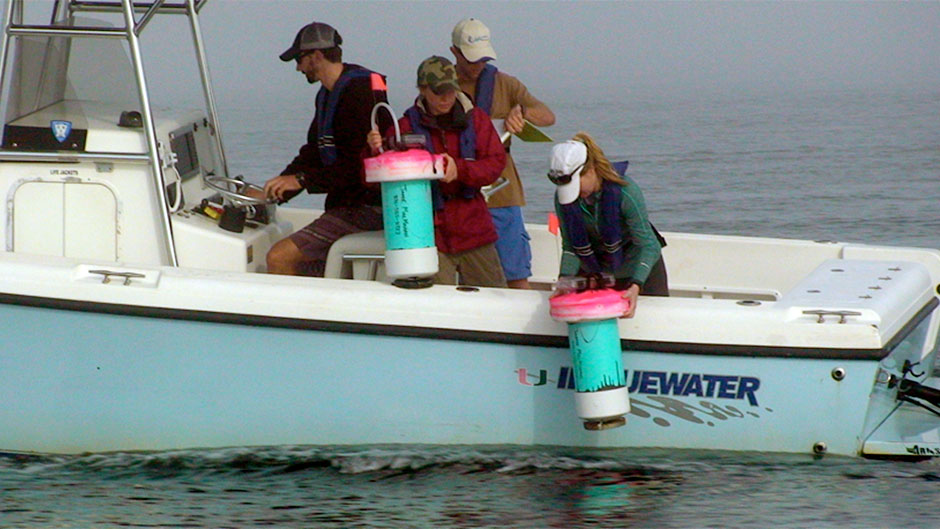Researchers at the University of Miami Rosenstiel School of Marine and Atmospheric Science were awarded more than $29 million in research grants from the Gulf of Mexico Research Initiative (GoMRI) to lead the Consortium for Advanced Research on the Transport of Hydrocarbons in the Environment (CARTHE) and to study the toxic effects of crude oil on fish that reside in the Gulf of Mexico.
UM Rosenstiel School was the only research institution to receive two of the 12 highly competitive research grants awarded by GoMRI.
“We are thrilled that GoMRI awarded such a substantial portion of the overall research funds to the two exceptional research teams put together by our scientists in collaboration with many partners at various institutions,” said Rosenstiel School Dean Roni Avissar. “This will allow these two teams to conduct the critical research studies necessary to understand the impacts of oil spills from both oceanographic and biological perspectives.”
Under the leadership of Rosenstiel School Professor Tamay Özgökmen, the CARTHE research consortium received over $20 million to continue the research necessary to predict the fate of oil released into the environment to help inform and guide response teams in the event of future oil spills. This second phase of CARTHE, which supports research through 2017, will help scientists develop and improve computational tools to accurately predict the fate of hydrocarbons found in crude oil that are released into the environment, and help to guide risk management and response efforts in mitigation and restoration of the economy and the ecosystem in situations like the Deepwater Horizon oil spill.
“An integral part of any informed response to a future event like the 2010 Deepwater Horizon oil spill requires knowledge of the distribution of pollutants in the water column and the ability to predict where and how fast the pollutants will spread,” said Özgökmen, lead investigator of CARTHE. “This information is also crucial to estimate the pollutants’ impact on the local ecosystem and coastal communities.”
Since 2011, CARTHE has conducted two major observational experiments – GLAD (Grand Lagrangian Deployment) and SCOPE (Surfzone Coastal Oil Pathways Experiment), several laboratory experiments, developed enhanced ocean transport models, and produced 75 peer-reviewed, scientific articles (53 published/accepted, 22 submitted).
The second research consortium, RECOVER, led by Rosenstiel School Professor Martin Grosell received a $9 million research award to conduct further studies on the impacts and toxic effects of crude oil on ecologically and commercially valuable fish that reside in the Gulf of Mexico. The RECOVER team (Relationships of Effects of Cardiac Outcomes in fish for Validation of Ecological Risk), which consists of seven members from four institutions, will conduct studies at the molecular, cellular, organ level and whole animal physiology as well as behavioral studies at different life stages for two important Gulf of Mexico fishes, the coastal redfish and the pelagic mahi-mahi.
Previous studies by the RECOVER consortium members showed that fish embryos and larvae exposed to crude oil during early development results in malformation of hearts, which likely results in mortality or reduced cardiac performance in surviving individuals. The RECOVER team also recently published a study that showed that such surviving individuals display reduced swimming capabilities.
“There is still much more to understand about the impacts of crude oil on fish at all life stages,” said Grosell. “We are pleased GoMRI has chosen to invest in our important work in this area.”
The CARTHE and RECOVER awards are part of a $140 million research investment by GoMRI to support research on the impacts of oil, dispersed oil, and dispersant on the Gulf of Mexico ecosystem and public health to be carried out from 2015 through 2017.
GoMRI is a ten year research initiative established in 2010 and funded by a $500 million commitment by BP. GoMRI is administered by an independent Research Board, which consists of 20 experts in science, research administration, and public health. The research Board evaluates research proposals following merit review guidelines of the National Academies of Science and procedures similar to those of the U.S. National Science Foundation. All funding decisions are made by the Research Board, which is independent of BP and not connected to the Natural Resources Damage Assessment process.

